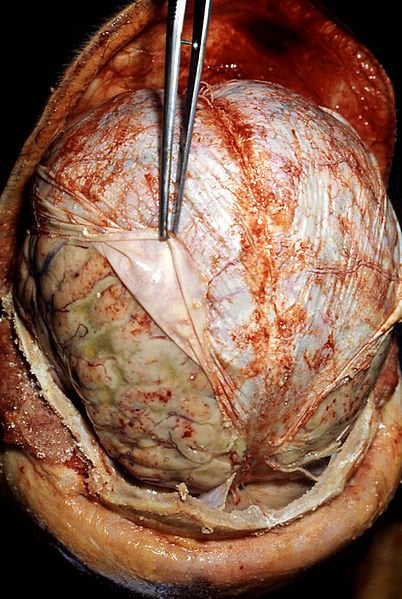In a study of adults with severe bacterial meningitis, therapeutic hypothermia (reduction of body temperature) did not improve outcomes, and it may even have been harmful, according to a study appearing in the November 27 issue of JAMA.
Among adults with bacterial meningitis, the case fatality rate and frequency of neurologic complications are high, especially among patients with pneumococcal meningitis. In animal models of meningitis, moderate hypothermia has shown favorable effects, according to background information in the article.
Bruno Mourvillier, M.D., of the Universite Paris Diderot, Sorbonne Paris Cite, Paris, and colleagues examined the effect of induced hypothermia on outcomes in patients with severe bacterial meningitis. The study, conducted at 49 intensive care units in France, randomized 98 comatose adults to hypothermia (n = 49), comprising a loading dose of 4°C cold saline and cooling to 32°C to 34°C for 48 hours; or standard care (n = 49). The primary outcome measure was the score at 3 months on the Glasgow Outcome Scale, an assessment of physical function following cerebral injuries.

The trial was stopped early at the request of the data and safety monitoring board because of concerns over excess mortality in the hypothermia group (25 of 49 patients [51 percent]) vs. the control group (15 of 49 patients [31 percent]). Pneumococcal meningitis was diagnosed in 77 percent of patients. At 3 months, 86 percent in the hypothermia group compared with 74 percent of controls had an unfavorable outcome.
After adjustment for factors that might explain the findings, mortality remained higher, although the increase was no longer statistically significant, in the hypothermia group. Subgroup analysis on patients with pneumococcal meningitis showed similar results. “Although there was a trend toward higher mortality and rate of unfavorable outcome in the hypothermia group, early stopping of clinical trials is known to exaggerate treatment effects, precluding firm conclusions about harm of therapeutic hypothermia in bacterial meningitis,” the authors write.
“In conclusion, our trial does not support the use of hypothermia in adults with severe meningitis. Moderate hypothermia did not improve outcome in patients with severe bacterial meningitis and may even be harmful. Our results may have important implications for future trials on hypothermia in patients presenting with septic shock or stroke. Careful evaluation of safety issues in these future and ongoing trials are needed.”
Notes about this neurology research
Contact: Bruno Mourvillier, M.D. – The JAMA Network Journals
Source: The JAMA Network Journals press release
Image Source: The image and portion of the description are credited to CDC/ Dr. Edwin P. Ewing, Jr. and is in the public domain.
Original Research: Abstract for “Induced Hypothermia in Severe Bacterial Meningitis: A Randomized Clinical Trial” by Bruno Mourvillier, MD; Florence Tubach, MD, PhD; Diederik van de Beek, MD, PhD; Denis Garot, MD; Nicolas Pichon, MD; Hugues Georges, MD; Laurent Martin Lefevre, MD; Pierre-Edouard Bollaert, MD; Thierry Boulain, MD; David Luis, MD; Alain Cariou, MD; Patrick Girardie, MD; Riad Chelha, MD; Bruno Megarbane, MD, PhD; Arnaud Delahaye, MD; Ludivine Chalumeau-Lemoine, MD; Stéphane Legriel, MD; Pascal Beuret, MD; François Brivet, MD; Cédric Bruel, MD; Fabrice Camou, MD; Delphine Chatellier, MD; Patrick Chillet, MD; Bernard Clair, MD; Jean-Michel Constantin, MD; Alexandre Duguet, MD; Richard Galliot, MD; Frédérique Bayle, MD; Hervé Hyvernat, MD; Kader Ouchenir, MD; Gaetan Plantefeve, MD; Jean-Pierre Quenot, MD; Jack Richecoeur, MD; Carole Schwebel, MD; Michel Sirodot, MD; Marina Esposito-Farèse, PhD; Yves Le Tulzo, MD, PhD; and Michel Wolff, MD in JAMA. Published online November 27 2013 doi:10.1001/jama.2013.280506






